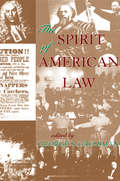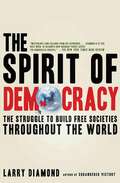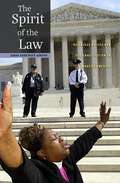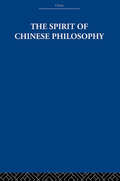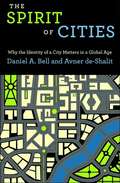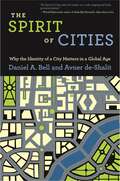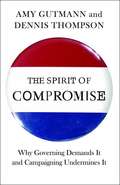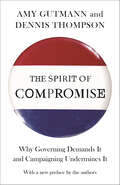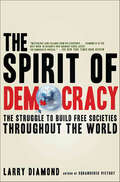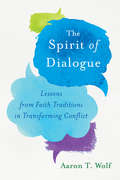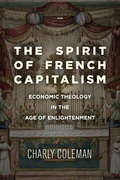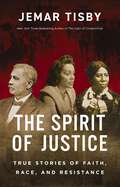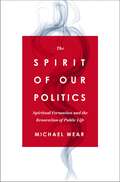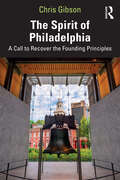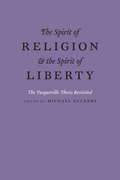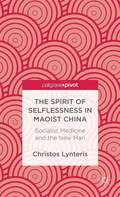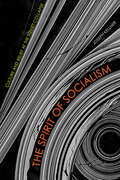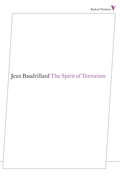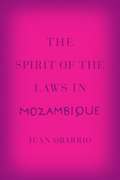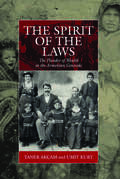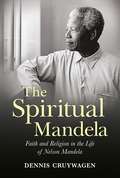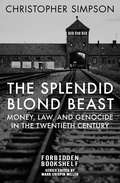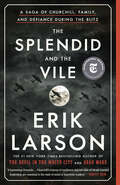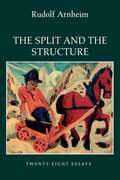- Table View
- List View
The Spirit Of American Law: An Anthology
by George S GrossmanIntended for the general public, the readings in this collection explore the roots of American law from pre-history to ancient Greece and Rome and the common law of England. America's legal development is traced from the drafting of the Constitution to the Rehnquist Court. Themes along the way include the ?Golden Age? of the early nineteenth century, when American law took on its distinctive character, the impact of slavery and the Civil War, and the struggles of the Progressives to regulate the nation's industrialized economy between the post-Civil War era and the New Deal. A reading on the Nuremberg Trials introduces the theme of international human rights, while post-war readings trace the nation's legal confrontations over civil liberties, civil rights, the rights of women, the protection of the environment, and legal protections for those accused of crimes. Dramatic highlights include the Sacco-Vanzetti case, the internment of Japanese-Americans during the Second World War, the trial of the ?Chicago Eight? during the Vietnam War, and the Watergate scandal. Leading personalities include Sirs Edward Coke and William Blackstone in England, Chief Justices John Marshall and Earl Warren, Justices Stephen J. Field, Oliver Wendell Holmes, Jr., Louis D. Brandeis, and Felix Frankfurter, and Judge Learned Hand. Readings on the future of American law explore the impact of alternative dispute resolution, science and technology, globalization, and space exploration, as well as trends in the legal profession and in legal philosophy.
The Spirit Of Democracy: The Struggle To Build Free Societies Throughout The World
by Larry Diamond"Meticulous . . . [Diamond] gleaned that . . . the fate of democracy was not driven by events but by the passion of individual people."―The New York Times Book Review In 1974, nearly three-quarters of all countries were dictatorships; today, more than half are democracies. Yet recent efforts to promote democracy have stumbled, and many democratic governments are faltering. In this sweeping vision for advancing freedom around the world, renowned social scientist Larry Diamond examines how and why democracy progresses. He demonstrates that the desire for democracy runs deep, even in very poor countries, and that seemingly entrenched regimes like Iran and China could become democracies within a generation. He also dissects the causes of the "democratic recession" in critical states, including the crime-infested oligarchy in Russia and the strong-armed populism of Venezuela. To spur a renewed democratic boom Diamond urges the United States to vigorously support good governance and free civic organizations. Only then will the spirit of democracy be secured.
The Spirit Of The Law: Religious Voices And The Constitution In Modern America
by Sarah Barringer GordonA new constitutional world burst into American life in the mid-twentieth century. For the first time, the national constitution's religion clauses were extended by the United States Supreme Court to all state and local governments. As energized religious individuals and groups probed the new boundaries between religion and government and claimed their sacred rights in court, a complex and evolving landscape of religion and law emerged. <P><P> Sarah Gordon tells the stories of passionate believers who turned to the law and the courts to facilitate a dazzling diversity of spiritual practice. Legal decisions revealed the exquisite difficulty of gauging where religion ends and government begins. Controversies over school prayer, public funding, religion in prison, same-sex marriage, and secular rituals roiled long-standing assumptions about religion in public life. The range and depth of such conflicts were remarkable--and ubiquitous. <P><P> Telling the story from the ground up, Gordon recovers religious practices and traditions that have generated compelling claims while transforming the law of religion. From isolated schoolchildren to outraged housewives and defiant prisoners, believers invoked legal protection while courts struggled to produce stable constitutional standards. In a field dominated by controversy, the vital connection between popular and legal constitutional understandings has sometimes been obscured. The Spirit of the Law explores this tumultuous constitutional world, demonstrating how religion and law have often seemed irreconcilable, even as they became deeply entwined in modern America.
The Spirit of Chinese Philosophy
by Fung Yu-LanFirst published in 1947.The Spirit of Chinese Philosophy covers the major philosophers and philosophical movements in China from Confucius to the middle of the twentieth century including: Confucius, Mencius, Yang Chu and Mo Ti, the Dialecticians and Logicians, Lao Tzu and Chuang Tzu, The Han Scholars, The Mystical School, The Ch'an Tsung of Buddhism, The Neo-Confucianist Philosophy.
The Spirit of Cities: Why the Identity of a City Matters in a Global Age
by Daniel A. Bell Avner De-ShalitCities shape the lives and outlooks of billions of people, yet they have been overshadowed in contemporary political thought by nation-states, identity groups, and concepts like justice and freedom. The Spirit of Cities revives the classical idea that a city expresses its own distinctive ethos or values. In the ancient world, Athens was synonymous with democracy and Sparta represented military discipline. In this original and engaging book, Daniel Bell and Avner de-Shalit explore how this classical idea can be applied to today's cities, and they explain why philosophy and the social sciences need to rediscover the spirit of cities. Bell and de-Shalit look at nine modern cities and the prevailing ethos that distinguishes each one. The cities are Jerusalem (religion), Montreal (language), Singapore (nation building), Hong Kong (materialism), Beijing (political power), Oxford (learning), Berlin (tolerance and intolerance), Paris (romance), and New York (ambition). Bell and de-Shalit draw upon the richly varied histories of each city, as well as novels, poems, biographies, tourist guides, architectural landmarks, and the authors' own personal reflections and insights. They show how the ethos of each city is expressed in political, cultural, and economic life, and also how pride in a city's ethos can oppose the homogenizing tendencies of globalization and curb the excesses of nationalism. The Spirit of Cities is unreservedly impressionistic. Combining strolling and storytelling with cutting-edge theory, the book encourages debate and opens up new avenues of inquiry in philosophy and the social sciences. It is a must-read for lovers of cities everywhere.
The Spirit of Cities: Why the Identity of a City Matters in a Global Age
by Daniel A. Bell Avner de-ShalitA lively and personal book that returns the city to political thoughtCities shape the lives and outlooks of billions of people, yet they have been overshadowed in contemporary political thought by nation-states, identity groups, and concepts like justice and freedom. The Spirit of Cities revives the classical idea that a city expresses its own distinctive ethos or values. In the ancient world, Athens was synonymous with democracy and Sparta represented military discipline. In this original and engaging book, Daniel Bell and Avner de-Shalit explore how this classical idea can be applied to today's cities, and they explain why philosophy and the social sciences need to rediscover the spirit of cities.Bell and de-Shalit look at nine modern cities and the prevailing ethos that distinguishes each one. The cities are Jerusalem (religion), Montreal (language), Singapore (nation building), Hong Kong (materialism), Beijing (political power), Oxford (learning), Berlin (tolerance and intolerance), Paris (romance), and New York (ambition). Bell and de-Shalit draw upon the richly varied histories of each city, as well as novels, poems, biographies, tourist guides, architectural landmarks, and the authors' own personal reflections and insights. They show how the ethos of each city is expressed in political, cultural, and economic life, and also how pride in a city's ethos can oppose the homogenizing tendencies of globalization and curb the excesses of nationalism.The Spirit of Cities is unreservedly impressionistic. Combining strolling and storytelling with cutting-edge theory, the book encourages debate and opens up new avenues of inquiry in philosophy and the social sciences. It is a must-read for lovers of cities everywhere. In a new preface, Bell and de-Shalit further develop their idea of "civicism," the pride city dwellers feel for their city and its ethos over that of others.
The Spirit of Compromise
by Amy Gutmann Dennis ThompsonIf politics is the art of the possible, then compromise is the artistry of democracy. Unless one partisan ideology holds sway over all branches of government, compromise is necessary to govern for the benefit of all citizens. A rejection of compromise biases politics in favor of the status quo, even when the rejection risks crisis. Why then is compromise so difficult in American politics today? In The Spirit of Compromise, eminent political thinkers Amy Gutmann and Dennis Thompson connect the rejection of compromise to the domination of campaigning over governing--the permanent campaign---in American democracy today. They show that campaigning for political office calls for a mindset that blocks compromise--standing tenaciously on principle to mobilize voters and mistrusting opponents in order to defeat them. Good government calls for an opposite cluster of attitudes and arguments--the compromising mindset--that inclines politicians to adjust their principles and to respect their opponents. It is a mindset that helps politicians appreciate and take advantage of opportunities for desirable compromise.Gutmann and Thompson explore the dynamics of these mindsets by comparing the historic compromises on tax reform under President Reagan in 1986 and health care reform under President Obama in 2010. Both compromises were difficult to deliver but only tax reform was bipartisan. Drawing lessons from these and other important compromises--and failures to compromise--in American politics, Gutmann and Thompson propose changes in our political institutions, processes, and mindsets that would encourage a better balance between campaigning and governing.Calling for greater cooperation in contemporary politics, The Spirit of Compromise will interest all who care about whether their government leaders can work together.
The Spirit of Compromise: Why Governing Demands It and Campaigning Undermines It
by Amy Gutmann Dennis ThompsonWhy compromise is essential for effective government and why it is missing in politics todayTo govern in a democracy, political leaders have to compromise. When they do not, the result is political paralysis—dramatically demonstrated by the gridlock in Congress in recent years. In The Spirit of Compromise, eminent political thinkers Amy Gutmann and Dennis Thompson show why compromise is so important, what stands in the way of achieving it, and how citizens can make defensible compromises more likely. They urge politicians to focus less on campaigning and more on governing. In a new preface, the authors reflect on the state of compromise in Congress since the book's initial publication.Calling for greater cooperation in contemporary politics, The Spirit of Compromise will interest everyone who cares about making government work better for the good of all.
The Spirit of Democracy: The Struggle to Build Free Societies Throughout the World
by Larry DiamondOne of America's preeminent experts on democracy charts the future prospects for freedom around the world in the aftermath of Iraq and deepening authoritarianismOver three decades, the world was transformed. In 1974, nearly three-quarters of all countries were dictatorships; today, more than half are democracies. Yet recent efforts to promote democracy have stumbled, and many democratic governments are faltering. In this bold and sweeping vision for advancing freedom around the world, social scientist Larry Diamond examines how and why democracy progresses. He demonstrates that the desire for democracy runs deep, even in very poor countries, and that seemingly entrenched regimes like Iran and China could become democracies within a generation. He also dissects the causes of the "democratic recession" in critical states, including the crime-infested oligarchy in Russia and the strong-armed populism of Venezuela. Diamond cautions that arrogance and inconsistency have undermined America's aspirations to promote democracy. To spur a renewed democratic boom, he urges vigorous support of good governance—the rule of law, security, protection of individual rights, and shared economic prosperity—and free civic organizations. Only then will the spirit of democracy be secured.
The Spirit of Dialogue: Lessons from Faith Traditions in Transforming Conflict
by Aaron T. WolfWe tend to approach conflict from the perspective of competing interests. A farmer's interest lies in preserving water for crops, while an environmentalist's interest is in using that same water for instream habitats. It's hard to see how these interests intersect. But what if there was a different way to understand each party's needs?Aaron T. Wolf has spent his career mediating such conflicts, both in the U.S. and around the world. He quickly learned that in negotiations, people are not automatons, programed to defend their positions, but are driven by a complicated set of dynamics—from how comfortable (or uncomfortable) the meeting room is to their deepest senses of self. What approach or system of understanding could possibly untangle all these complexities? Wolf's answer may be surprising to Westerners who are accustomed to separating religion from science, rationality from spirituality.Wolf draws lessons from a diversity of faith traditions to transform conflict. True listening, as practiced by Buddhist monks, as opposed to the "active listening” advocated by many mediators, can be the key to calming a colleague's anger. Alignment with an energy beyond oneself, what Christians would call grace, can change self-righteousness into community concern. Shifting the discussion from one about interests to one about common values—both farmers and environmentalists share the value of love of place—can be the starting point for real dialogue.As a scientist, Wolf engages religion not for the purpose of dogma but for the practical process of transformation. Whether atheist or fundamentalist, Muslim or Jewish, Quaker or Hindu, any reader involved in difficult dialogue will find concrete steps towards a meeting of souls.
The Spirit of French Capitalism: Economic Theology in the Age of Enlightenment (Currencies: New Thinking for Financial Times)
by Charly ColemanHow did the economy become bound up with faith in infinite wealth creation and obsessive consumption? Drawing on the economic writings of eighteenth-century French theologians, historian Charly Coleman uncovers the surprising influence of the Catholic Church on the development of capitalism. Even during the Enlightenment, a sense of the miraculous did not wither under the cold light of calculation. Scarcity, long regarded as the inescapable fate of a fallen world, gradually gave way to a new belief in heavenly as well as worldly affluence. Animating this spiritual imperative of the French economy was a distinctly Catholic ethic that—in contrast to Weber's famous "Protestant ethic"—privileged the marvelous over the mundane, consumption over production, and the pleasures of enjoyment over the rigors of delayed gratification. By viewing money, luxury, and debt through the lens of sacramental theory, Coleman demonstrates that the modern economy casts far beyond rational action and disenchanted designs, and in ways that we have yet to apprehend fully.
The Spirit of Justice: True Stories of Faith, Race, and Resistance
by Jemar TisbyThe Black History You Never Knew: Uncovering Unsung Heroes in the Struggle for Racial Justice.The Spirit of Justice reveals the stories of the people who fought against racism and agitated for justice—and what we can learn from their example, their suffering, their methods, and their hope.How is it that people still work for change after continuously seeing the worst of humanity and experiencing the most demoralizing setbacks? What keeps them going? It is that spirit of justice that rises up "like a war horse," as Myrlie Evers-Williams famously said. It is a sense in the hearts of people who hunger and thirst for righteousness.In this book, award-winning author Jemar Tisby will open your eyes to the "pattern of endurance" in the centuries-long struggle for Black freedom in America. Through a historical survey of the nation from its founding to the present day, this book gives real-world examples of people who opposed racism, how they did it, what it cost, and what they gained for themselves and others.For those who were galvanized by Tisby's call to action in his acclaimed The Color of Compromise, this book will inspire you to see past the complicity of the church and gain the determination to join the fight for racial justice, no matter the cost.As Tisby writes, "The Spirit of justice is always at work to inspire followers of Christ to undertake acts of liberation and bear witness to the good news of their savior."
The Spirit of Our Politics: Spiritual Formation and the Renovation of Public Life
by Michael R. WearFor those discouraged and exhausted by the bitterness and rage in our politics, Michael Wear offers a new paradigm of political involvement rooted in the teachings of Jesus and drawing insights from Dallas Willard's approach to spiritual formation.When political division shows up not only on the campaign trail but also at our dinner tables, we wonder: Can we be part of a better way? The Spirit of Our Politics says "yes," offering a distinctly Christian approach to politics that results in healing rather than division, kindness rather than hatred, and hope rather than despair.In this profound and hope-filled book, Michael Wear--a leading thinker and practitioner at the intersection of faith and politics--applies insights taken from the work of Dallas Willard to argue that by focusing on having the "right" politics, we lose sight of the kind of people we are becoming, to destructive results. This paradigm-shifting book reveals:Why we need to reframe how we view our political involvement as ChristiansHow as Christians we can reorient our politics for the good of othersThe crucial connection between discipleship to Jesus and political involvementA different way of talking about politics that is edifying, not stomach-turningHow to navigate political strife in churches and small groupsWhy who we are in our political life is not quarantined from who we are in "real life"Why gentleness is entirely possible in our political discourse The Spirit of Our Politics is for readers of any political perspective who long for a new way to think about and engage in politics. That new approach begins with a simple question: What kind of person would I like to be?
The Spirit of Philadelphia: A Call to Recover the Founding Principles
by Chris GibsonThe Spirit of Philadelphia is America’s story told through the history of ideas and a cautionary tale of what happens when a nation’s Spirit goes dormant.This book proposes a return of the American government to the philosophical roots as articulated by the U.S. Constitution and its Framers. Grounded in realism, the Founders successfully balanced the needs and rights of the individual with those of the collective, creating a system that prioritized both personal liberty and societal order. Author and former Congressman Chris Gibson argues that abandoning the “Spirit of Philadelphia” (essentially the national spirit of cooperation, compromise, and teamwork) enabled dysfunction in government and disillusionment in the constituency. Culminating a comprehensive list of policy recommendations that logically analyze issues in the American political system, the author proposes an agenda aimed at restoring faith and functionality in national institutions and leaders, fostering bipartisan communication and collaboration, and revitalizing civic engagement at the individual level.Illustrating the changes in the political landscape of America since the Philadelphia convention, this book is an important read for students of democracy, political participation, elections, and voter behavior.
The Spirit of Religion and the Spirit of Liberty: The Tocqueville Thesis Revisited
by Michael ZuckertTocqueville’s thesis on the relation between religion and liberty could hardly be timelier. From events in the Middle East and the spread of Islamist violence in the name of religion to the mandated coverage under the Affordable Care Act, the interaction between religion and politics has once again become central to political life. Tocqueville, facing the coming of a new social and political order within the traditional society that was France, faced this relation between politics and religion with freshness and relevance. He was particularly interested in reporting to his French compatriots on how the Americans had successfully resolved what, to many Frenchmen, looked to be an insuperable conflict. His surprising thesis was that the right kind of arrangement—a certain kind of separation of church and state that was not also a complete separation of religion and politics—could be seen in nineteenth century America to be beneficial to both liberty and religion. This volume investigates whether Tocqueville’s depiction was valid for the America he investigated in the 1830s and whether it remains valid today.
The Spirit of Selflessness in Maoist China
by Christos LynterisAssuming power in 1949, the Chinese Communist Party was soon faced with a crucial problem: how to construct the socialist 'New Man'? Using Foucault's theory of 'technologies of the self', Lynteris examines the conflict between self-cultivation and the abolition of the self in the biopolitically neuralgic field of 'socialist medicine'.
The Spirit of Socialism: Culture and Belief at the Soviet Collapse
by Joseph KellnerThe Spirit of Socialism is a cultural history of the Soviet collapse. It examines the millions of Soviet people who, during the cascading crises of the collapse and the post-Soviet transition, embarked on a spirited and highly visible search for new meaning. Amid profound disorientation, these seekers found direction in their horoscopes, or behind gurus in saffron robes or apocalyptic preachers, or by turning from the most basic premises of official science and history to orient themselves anew. The beliefs they seized on and, even more, the questions that guided their search reveal the essence of late-Soviet culture and its legacy in post-Soviet Russia.To skeptical outsiders, the seekers appeared eccentric, deviant, and above all un-Soviet. Yet they came to their ideas by Soviet sources and Soviet premises. As Joseph Kellner demonstrates, their motley beliefs reflect modern values that formed the spiritual core of Soviet ideology, among them a high regard for science, an informed and generous internationalism, and a confidence in humanity to chart its own course. Soviet ideology failed, however, to unite these values in an overarching vision that could withstand historical change.And so, as The Spirit of Socialism shows, the seekers asked questions raised but not resolved by the Russian Revolution and subsequent Soviet order—questions of epistemic authority, of cultural identity, and of history's ultimate meaning. Although the Soviet collapse was not the end of history, it was a rupture of epochal significance, whose fissures extend into our own uncertain era.
The Spirit of Terrorism
by Jean Baudrillard Chris TurnerBaudrillard sees the power of the terrorists as lying in the symbolism of slaughter--not merely the reality of death, but in a sacrifice that challenges the whole system. Where previously the old revolutionary sought to conduct a struggle between real forces in the context of ideology and politics, the new terrorist mounts a powerful symbolic challenge which, when combined with high-tech resources, constitutes an unprecedented assault on an over-sophisticated and vulnerable West. This new edition is up-dated with the essays "Hypotheses on Terrorism" and "Violence of the Global."From the Trade Paperback edition.
The Spirit of the Laws in Mozambique
by Juan ObarrioMozambique has been hailed as a success story by the international community, which has watched it evolve through a series of violent political upheavals: from colonialism, through socialism, to its current democracy. As Juan Obarrio shows, however, this view neglects a crucial element in Mozambique's transition to the rule of law: the reestablishment of traditional chieftanship and customs entangled within a history of colonial violence and civil war. Drawing on extensive historical records and ethnographic fieldwork, he examines the role of customary law in Mozambique to ask a larger question: what is the place of law in the neoliberal era, in which the juridical and the economic are deeply intertwined in an ongoing state of structural adjustment?
The Spirit of the Laws: The Plunder of Wealth in the Armenian Genocide
by Taner Akçam Umit KurtPertinent to contemporary demands for reparations from Turkey is the relationship between law and property in connection with the Armenian Genocide. This book examines the confiscation of Armenian properties during the genocide and subsequent attempts to retain seized Armenian wealth. Through the close analysis of laws and treaties, it reveals that decrees issued during the genocide constitute central pillars of the Turkish system of property rights, retaining their legal validity, and although Turkey has acceded through international agreements to return Armenian properties, it continues to refuse to do so. The book demonstrates that genocides do not depend on the abolition of the legal system and elimination of rights, but that, on the contrary, the perpetrators of genocide manipulate the legal system to facilitate their plans.
The Spiritual Mandela: Faith and Religion in the Life of Nelson Mandela
by Dennis CruywagenIn the first book of its kind, an acclaimed South African journalist and former parliamentary spokesperson for the ANC shares how Nelson Mandela balanced his Christian faith with his political views, exploring how the beloved leader reconciled his own beliefs with the hard truth that religion had often been used as a tool to oppress his people. ♦ "Insightful. . . a nuanced understanding of how faith influenced the renowned civil rights activist." — Publishers Weekly, starred review ". . .illuminating and an essential addition to studies of Mandela's life and work." —Booklist Nelson Mandela revealed nothing about his personal religious beliefs in his writings or in his public pronouncements. But those who were close to him know that he held Christian views. At his request, the final components of his funeral followed the Methodist service. Acclaimed journalist Dennis Cruywagen traces the spiritual component of Mandela's life, from his youth in a traditional Thembu village to his education at Wesleyan and Methodist mission schools to his time as an activist to his period on Robben Island and the years thereafter. Based on interviews with some of Mandela's close colleagues, such as Ahmed Kathrada, as well as priests and other religious figures with whom he interacted, this book unearths an unknown dimension of one of recent history's most respected men.
The Spite Game
by Anna SnoekstraEveryone does bad things when no one is watchingMercilessly bullied in high school, Ava knows she needs to put the past behind her and move on, but she can’t—not until she’s exacted precise, catastrophic revenge on the people who hurt her the most.First, she watches Saanvi. Flawlessly chic and working hard at a top architectural firm, Saanvi has it all together on the surface. But everyone does bad things when they think no one is watching and Ava only wants what’s fair—to destroy Saanvi’s life the way her own was destroyed.Next, she watches Cass. She’s there as Cass tries on wedding dresses, she’s there when Cass picks out a cake, she’s there when Cass betrays her fiancé. She’s the reason Cass’s entire future comes crashing down. Finally, Ava watches Mel. Mel was always the ringleader and if anyone has to pay, it’s her. But one tiny slipup and Ava realizes the truth: Mel knows she’s being watched, and she’s ready to play Ava’s games to the bitter end.
The Splendid Blond Beast: Money, Law, and Genocide in the Twentieth Century (Forbidden Bookshelf #24)
by Christopher SimpsonFrom a National Jewish Book Award–winning author: The &“revelatory and shocking&” investigation into the CIA&’s liberation of Nazi war criminals (Kirkus Reviews). How did Gen, Karl Wolff, one of the highest-ranking members of the Nazi Party&’s Waffen-SS, who personally oversaw the deportation of three hundred thousand Jews to the Treblinka extermination camps, escape prosecution at the Nuremberg trials? As revealed in this groundbreaking investigation—culled from recently uncovered archival documents—the answer lies within the US government, which buried reports on the Final Solution and was complicit in the recruitment of Nazi war criminals, all to protect the world economy. Among the key players was CIA director Allen Dulles, who was not only instrumental in Wolff&’s exoneration but also responsible for installing former slave-labor specialists into positions of power in postwar Germany. In this damning exposé of American government malfeasance, author Christopher Simpson traces the roots of mass murder as an instrument of financial gain and state power, from the Armenian genocide during World War I to Hitler&’s Holocaust through the practice of genocide today. Detailing how the existing structures of international law and commerce have encouraged mass killings, corporate looting, and profiteering at the expense of innocent victims, The Splendid Blond Beast is a disturbing and profound book about the success of evil in our time. The award-winning author of Blowback and Science of Coercion, Simpson also served as research director for Marcel Ophüls&’s Oscar-winning documentary, Hôtel Terminus: The Life and Times of Klaus Barbie.
The Splendid and the Vile: A Saga of Churchill, Family, and Defiance During the Blitz
by Erik Larson#1 NEW YORK TIMES BESTSELLER • The author of The Devil in the White City and Dead Wake delivers an intimate chronicle of Winston Churchill and London during the Blitz—an inspiring portrait of courage and leadership in a time of unprecedented crisis &“One of [Erik Larson&’s] best books yet . . . perfectly timed for the moment.&”—Time • &“A bravura performance by one of America&’s greatest storytellers.&”—NPR NAMED ONE OF THE BEST BOOKS OF THE YEAR BY The New York Times Book Review • Time • Vogue • NPR • The Washington Post • Chicago Tribune • The Globe & Mail • Fortune • Bloomberg • New York Post • The New York Public Library • Kirkus Reviews • LibraryReads • PopMattersOn Winston Churchill&’s first day as prime minister, Adolf Hitler invaded Holland and Belgium. Poland and Czechoslovakia had already fallen, and the Dunkirk evacuation was just two weeks away. For the next twelve months, Hitler would wage a relentless bombing campaign, killing 45,000 Britons. It was up to Churchill to hold his country together and persuade President Franklin Roosevelt that Britain was a worthy ally—and willing to fight to the end. In The Splendid and the Vile, Erik Larson shows, in cinematic detail, how Churchill taught the British people &“the art of being fearless.&” It is a story of political brinkmanship, but it&’s also an intimate domestic drama, set against the backdrop of Churchill&’s prime-ministerial country home, Chequers; his wartime retreat, Ditchley, where he and his entourage go when the moon is brightest and the bombing threat is highest; and of course 10 Downing Street in London. Drawing on diaries, original archival documents, and once-secret intelligence reports—some released only recently—Larson provides a new lens on London&’s darkest year through the day-to-day experience of Churchill and his family: his wife, Clementine; their youngest daughter, Mary, who chafes against her parents&’ wartime protectiveness; their son, Randolph, and his beautiful, unhappy wife, Pamela; Pamela&’s illicit lover, a dashing American emissary; and the advisers in Churchill&’s &“Secret Circle,&” to whom he turns in the hardest moments. The Splendid and the Vile takes readers out of today&’s political dysfunction and back to a time of true leadership, when, in the face of unrelenting horror, Churchill&’s eloquence, courage, and perseverance bound a country, and a family, together.
The Split and the Structure: Twenty-Eight Essays
by Rudolf ArnheimRudolf Arnheim's great forte is his ability to illuminate the perceptual processes that go into the making and reception of artworks—painting, sculpture, architecture, and film. Over the years, his pioneering mode of "reading" art from a unique scientific/philosophic perspective has garnered him an established and devoted audience. That audience will take pleasure in Arnheim's most recent collection of essays, one that covers a range of topics and includes titles such as "Outer Space and Inner Space," "What Is an Aesthetic Fact?," "As I Saw Children's Art," "Two Ways of Being Human," "Consciousness—an Island of Images," and "From Chaos to Wholeness."The notion of structure is Arnheim's guide in these explorations. Most of the essays examine the nature of structure affirmatively: how it comes about, its incentives and objectives, its celebration of perfection. He is interested in how artists grope for structure to shape powerful, enlightening images, and how a scientist's search for truth is a search for structure.Writing with enviable clarity, even when deploying complex arguments, Arnheim makes it easy and exciting to follow him as he thinks. America is not abundantly supplied with "public intellectuals" such as Rudolf Arnheim—to have his writings with us is cause for celebration. "The word 'structure' appears for good reason in the title of this collection. . . . Structure seems to be needed as an arbiter wherever this civilization of ours is split by selfish interests and fighting for either/or decisions. The essays want to speak with the voice of reason, because they want to show how the parts require the whole."
